Isolation has helped slow the spread of COVID-19, but it’s left many of us aching for company. In the fourth episode of his podcast, health workers open up to Mark Thomas about the loneliness of lockdown. Mark, meanwhile, reveals he has ballet danced through his darkest days, much to his mum’s dismay.
Splendid isolation
Hosted by Mark Thomassound by Helen Atkinsonproduced by Nicolas Kentproduced by Susan McNicholasphotography by Franklyn Rodgers
- Podcast
- Serial
Listen here
Speaker 1: Hello?
Speaker 2: How have you been? You all right?
Speaker 1: Yep, no problem.
Speaker 3: Oh, hello. Oh my goodness!
Speaker 4: Yeah, of course, that's fine.
Speaker 5: No, that's fine. Hello, yes.
Mark Thomas: Hello and welcome. You’ve joined me for the fourth episode of ‘Mark Thomas’s lockdown check-up’, the podcast that talks to health and care workers about their experiences during COVID-19. Most nights, I chat to an ever-growing network of clinical and care staff. And as well as collecting the details of their lives, I have found myself occasionally offloading my own burdens. Namely, the decision to spend lockdown with my 85-year-old mum in a small two-bedroom flat in south London, which has proved to be quite the bout of emotional trench warfare. I have at points described, during this podcast, the spare room that I sleep and record the podcast in as a monk’s cloister. Other times I’ve called it a panic room, but today it feels more like a warden’s office.
During the lockdown, my mum has started to refer to me as the jailer or the warden, a description that has not been helped by occasionally shouting, “Slop out!” by the bedroom door. While on the telephone to a mate – “the biddies”, as my mum refers to them – she will often proclaim things like...
Mark’s mum: Oh, the governor’s very stroppy, darling. Doesn’t like visiting times.
Mark Thomas: She has not taken to lockdown well. She misses her friends, and going out, and kids and grandkids coming in, and especially the great-grandkid. So despite the fact that she is in a high-risk category, being 85, and that she has more conditions and bits wrong with her than a Darby and Joan coach crash, she insists that it is all my fault she cannot go out.
So therefore I am the jailer and she is a latter-day Nelson Mandela fighting the system and waiting for the Soweto Gospel Choir to arrive outside her bedroom window singing songs for her release. Though I’m sure if they did, she would tell them to eff off, which I’m pretty sure is something Mr Mandela did not do.
My mum bemoans not being allowed to answer the door.
Mark’s mum: It’s easing up a bit now, but in the beginning it was like, “Leave the door. Don’t answer the door. I’ll go. What have you come out for?” Just to see somebody and say hello would have been nice, you know, but no.
Mark Thomas: I am afraid to admit that at one point I lost my temper and shouted, “If you want to go for a bloody walk – here, the door’s open, go!” To which my mum replied, “I would do, but I can’t get down the bloody first step.”
Isolation has not treated many of us well, and this is the theme of this podcast: isolation, and what we do to combat and embrace it. In some ways, I suppose it’s also about community. In talking to health and care workers, I have been shocked by the variety of types of isolation the pandemic has wrought upon us. And not all of these experiences have been unpleasant. At the start of the lockdown, I loved walking with the dog late at night. Ten o’clock to midnight was my preferred time, wrapped up against the April cold. And what I loved was the quiet, the stillness, and staring at the blossom on the trees under street lights or the moon glow.
George is a geriatric consultant and he describes one of his isolated pleasures; his journey to work.
George: My train was still going, part of the emergency TfL service. I’d just get a whole carriage to myself during the lockdown, which was lovely, actually. I was stopped by the police and there weren’t that many people on the train, but they were just doing random checks to make sure people were being sensible. As I saw him walking towards me, I just held up my badge and gave him a little smile and a wink. And he was like, “On you go.” So on you go. And it was kind of a nice feeling, yeah. Feeling like you’re someone special. I have to say, in a way, I’m going to kind of miss the lockdown in that respect because you have a private train cabin to yourself, and it’s going to be back to being a sardine again.
Mark Thomas: The term “splendid isolation” was a diplomatic description for having no fixed alliances and fighting battles and skirmishes on a case-by-case basis that suited national interests. My mum and I have been in splendid isolation.
We keep ourselves apart for much of the time, and when lockdown started, oh man, I was going to do such great things. Now that I had the time. I would learn to make choux pastry, become a tai chi master and write the great south London novel. In truth, I have mastered oven chips. I’m not sure it is a metaphor for Brexit, but isolation really doesn’t deliver on its promises. For most clinical and medical staff, cutting themselves off from family and friends has been, at best, a humdrum affair.
Max is a clinician and he sums up what I’m sure was a common response for medical staff.
Max: My partner’s in the vulnerable category. And although we don’t live together, we spend maybe three nights, four nights together, and that had to stop. I mean, I live alone and that’s fine, but you know, sometimes you go home and you want to talk to someone face to face. You want to have dinner and you’re not able to do that. And that’s quite hard generally, but if you’re doing that in the middle of a pandemic and you had a stressful day at work, that’s quite difficult.
Mark Thomas: As I am constantly around my mum, it means she doesn’t have anyone to offload to about me. Which is why my sister Ruth has proved very handy. Ruth is a vicar. She lives around the corner and she has taken on the role of listening to my mum’s confession. Though my mum tends to list my sins rather than her own. There have been moments when I have envied other people’s isolation from their loved one. Though, after talking to Anna, a hospice nurse, perhaps not so much.
Anna: And I’ve literally had to say to my husband, “No, don’t kiss me, I’ve been in an infected room. I’m going to shower now.” The day I started that job – because I knew they had COVID – I basically moved out of our bedroom into the spare bedroom. I was seeing me in my little box and him and his little box next door, and my parents around the corner in their little house and everyone was sort of in their little boxes and don’t dare, or can’t come out.
Mark Thomas: There is an adage about performers, and especially comics, that they are so addicted to performing that they open the fridge door, the light goes on, and they do five minutes. And I am no exception to this. I have missed performing. For me, there is something brilliant about the company of an audience. Performing, for me, is a creative endeavour, which is the most life-enhancing thing. And I realised I had not performed in front of anyone for months, unless you include performing ballet in my pants in front of the television first thing in the morning, while my mum’s splutters insults through the cornflakes.
This is Mike, a nurse in a care home. And when he talked about isolation, it wasn’t about the isolation of himself or his colleagues, or indeed the residents, but the relatives of the people in care homes.
Mike: I know one lady, when her mum died, she phoned up a couple of weeks ago and she wants to come back in when we open up just to see everybody and thank everybody personally for looking after her mum. And I’m looking forward to seeing her as well. We used to see family members three, four times a week, and then you don’t see them at all and just speak on the phone. They see the staff as friends as well, they’re not just staff. So it’s a big chunk missing out of their life as well. And it must have been difficult for them as well, if you think about they’ve been in lockdown. So they’ve had to stay at home because they’ve been in the catchment group, when they’ve been used to going out four or five times a week into the home to see their loved one who’s unfortunately passed away. So not only have they lost a loved one, they’ve lost that connection to the home.
Mark Thomas: One thing I noticed about my mum and I during this lockdown period has been our ability to quickly turn on each other. The slightest thing would trigger either of us. For my mum, offering her a cup of tea, it was an intolerable insult, as was asking if she’d finished with her bowl, finding her walking stick, and breathing, especially breathing through my nose. Me, obviously I was a beacon of sanity in moderation, except when she blinked or spoke or baked potatoes in the microwave.
This is Naomi, a nurse in a care home talking about her residents and the effect of the lockdown.
Naomi: Everyone is so depressed, all of the residents. It’s just about okay at the minute, because we’re able to be doing very, very few, but visits with relatives outside. Some of the residents were then in their rooms for April, May, to three months, March, April, May, June, four months, not coming out at all.
Mark Thomas: It was hard to avoid a comparison with my mum. She has been in lockdown for four months and she has not had the support of care-home staff, just a very grumpy and occasionally balletic son to help her.
Ruth is a public health worker in Liverpool, dealing with the local outbreaks, and while national test-and-trace schemes are failing to reach 25 per cent of the people they need to, and in places like Darwin, the failure rate is 50 per cent, local authority public health in Liverpool has managed to contact 95 to 98 per cent of the people it needs to. Ruth puts it down to local knowledge and contacts, but also because they make a point of supporting people.
Ruth: And self-isolating, that’s the thing that’s going to contain this. Once we’ve got positive cases, if they don’t self-isolate, all that contact tracing and all that effort is lost. So making sure we’ve got that support, so people genuinely can stay home is really important.
So the kind of things that we do is we ask them, what they need at home. basically. So we say, “Okay, you need to isolate for ten to 14 days. Are you going to be able to do that? Have you got friends and family who can do your shopping for you? Are you on any medications? Do you need to get anything from the pharmacy? Have you got any other needs, like walking a dog or anything else?” And generally we try, and obviously people have got friends and family and neighbours that can help them, we encourage them to go there first. But if they haven’t, then we will organise food to be delivered to their house. We will get contact with a volunteer – we’ve got some fantastic volunteers all across the country – and we much them with a volunteer who might go and walk the dog for them or just give them a call to check if they’re all right.
Mark Thomas: Many patients with other conditions have suffered in the lockdown. They have suffered because of the backlog created by suspending or limiting the service or by people being too frightened to come into hospital. However, I did speak to someone who had managed to treat patients throughout the pandemic’s worst moments.
Claire was one of the main organisers of an initiative in Norfolk that used a private hospital, the Spire, as a clean site. So they were able to continue the more routine work of the NHS by using isolation to protect those patients.
Claire: So we got offered the Spire location on the Friday. Within six days, we had it agreed between the two organisations and within ten days from starting, we had the first patient started over there. I think we had the opportunity to find other space and we just took it fast. So as soon as they said, “What options are there? How do we make space here?” We then looked at all the other places that were hospitalesque and went out to them and said, “Right, what can we move out? So we’ve got a dedicated place here that, should it happen, we’ve got one place that can be COVID, and then we’ve got a load of other little places that we can then move the safer cases out and the more essential work that needs to maintain.” So things have been real success over here.
Yes, we do about 800, 900 patients a week, get to go through it. And it’s just fantastic. It’s so nice to see them being able to maintain it.
Mark Thomas: To me, it was incredible that the normal functions of the NHS could continue when so much had been shut down. However, as we know all too well, it has been the care homes that have been woefully neglected.
Mike, the nurse in the care home who you heard earlier, he describes this feeling of isolation that his care home was under.
Mike: The media was just full of – and the government was – protect the NHS, protect the NHS, protect the NHS. There was absolutely no mention to the thousands of people who were in nursing homes. I don’t think we got any guidance initially. No, it was just work it out ourselves.
Mark Thomas: I mean, did you feel you were sort of like on your own?
Mike: Yeah, because nobody was talking about the care homes and these were the most vulnerable people. GPs stopped coming into the homes quite quickly. They wouldn’t come in. We’d have to phone up a GP and describe the symptoms over the phone and they’d make a decision that way. In fact, the last person who died, I had to do the verification of death because the GP wouldn’t come out. So normally when somebody dies a doctor will come out, examine the body, and confirm that that person’s dead. During the COVID the verification of death the doctors were doing was getting quicker and quicker. One colleague told me that 20 seconds was all it took for the doctor to run into the home.
Mark Thomas: Naomi describes the growing sense of fear, worry and panic about working in a care home that at times felt abandoned.
Naomi: I felt like we were getting into an unsafe space because we didn’t have adequate numbers of staff to deal with the situation. The whole ratio of clinical people present to residents just became very thin at one point. And you can only deliver drugs with a qualified nurse present and we didn’t have enough qualified nurses to do the drugs rounds.
Mark Thomas: So there was a clinical impact?
Naomi: Yeah. We just needed nurses. And I knew that there were loads of nurses at our local hospital. It’s not that they were doing nothing, but they had a lot of staff and we had no staff. I was like, I just want to go and knock on the door and say, “Please can you give me some nurses just for a few days because we’re really struggling.”
Mark Thomas: Did you feel isolated?
Naomi: Really, really isolated. Like a sinking ship at one point. And we were putting our hands up going “help” and it was really hard to know who would come and help us.
Mark Thomas: I mentioned earlier the companionship of an audience; there are things that just need to happen in groups. And I hope this doesn’t sound too clumsy a comparison, but if you’ve ever watched ‘The Big Sleep’ with Humphrey Bogart and Lauren Bacall on the telly and then watched it in the cinema, the two experiences are completely different. In the cinema, it becomes alive: it’s funny, it’s a really funny film, and you need a crowd with you to make it work.
I think equally it’s hard to grieve in isolation. It is something that we need to do in groups. This is Mike from the care home talking about what happened when he found out that one of his colleagues had died.
Mike: The first thing we did was we went outside and give them a round of applause, shouted up to the sky. We’re not religious, I’m not religious, but it felt the right thing to do.
Mark Thomas: The effect of being apart as communities of friends and family and colleagues is dramatic and it has been on all of us. And at some point I am convinced we will need to come together to do the things we have put off or, worse, things that we have done incompletely.
Naomi from the care home, picks up this idea of needing to be together.
Naomi: We’re not grieving. The families have had bizarre funerals, if any at all. We’ve watched a few funerals on whatever, cemeterytv.com. And it’s just bizarre. And I don’t know when we’re going to have a chance. In a way you can only do that together in community. And we can’t do that. We can’t have a gathering to say goodbye or say I’m sorry.
Mark Thomas: One of the things about recording from my mum’s spare room is it’s very, very reliant upon good phone signal and internet connectivity. These things were not always available, which I like to think gives the episodes a slight, well, kind of hipster, low-fi feel to it. I point this out because the sound quality is particularly hip in the next excerpt I’m going to play you.
The next conversation is with a woman called Sharon who works in the NHS. And we had started by discussing one of the images that emerged in the peak of the pandemic, the ten health and care workers to have died from COVID-19. And the fact that they were Black or Asian, it was an incredibly striking image and you could not avoid the implication. And when I spoke to Sharon, she was quick to point to the reports that highlighted the clinical problems facing Black and Asian staff.
Sharon: They’re more likely to do the most work but with having the least protection.
Mark Thomas: Does this leave you feeling exposed?
Sharon: Yes, it does. I still want to do the job, but just to be protected, basically. To have the same level of protection as everybody else, and not to be victimised. I mean, the fact that Black and Asians are disadvantaged by COVID, but they’ve always been disadvantaged, they’re more likely, like Black women are more likely to die from breast cancer, more likely to be triple negative. The outcome’s worse in cancer, in childbirth as well. Makes you wonder why that is. And I don’t think it’s a genetic reason.
When my mum worked as a nurse in the Seventies, she had a patient that refused to be treated by her and she had to deal with obvious racism with colleagues sometimes. But then again, she used to have patients that would only be treated by her as well, that only liked her, and didn’t trust anybody else.
Mark Thomas: Steve is a domestic ancillary worker; he’s a carer. And he’s faced very much the same kind of overt racism while doing his job that Sharon’s mum did in the Seventies.
Steve: There was one person that I was going to assist with a fellow co-worker. And I said to her, “Look, this person is quite bigoted. So don’t be too surprised if I get refused point blank to assist her.” And she was having none of it, so I just shrugged and said, “Well, so be it.” So we went down to the client, and lo and behold, she took one look at me, said, “I don’t want to work with him.” And that was it. And the look on my co-worker’s face said it all. So what I’m trying to say to you and other co-workers, is that, just because they don’t experience it themselves doesn’t mean to say it doesn’t exist.
Mark Thomas: One of the many interesting things that Steve talked about in his role as a domestic ancillary carer was how he loved the Clap for Carers. For me, the Clap for Carers was an incredible moment. It felt a truly communal event that defied isolation. But for Steve, it was a moment when he felt seen.
Steve: I think, at long last, woke up to the fact that there is people like me and others that are willing to go into the various clients’ house and do what’s needed. So that was really much appreciated. It was really nice to have people, at last, show some recognition.
Mark Thomas: I remember the first Clap for Carers and rushing out with a pot and pan, and feeling slightly overwhelmed by the sound of my neighbours bashing their pots and pans. I think the din, the noise, the cheering, the car horns, the clapping, it all seemed an attempt to bridge the distance between us, to bridge that distance of our isolation and unite us with sound.
Barbara works as a consultant in a major trauma unit and her team loved those Thursdays.
Barbara: I can’t tell you how much it’s meant to our team to feel loved by the general public, and hear it, and it be very visceral. And that’s really lovely. They love it. They all flock out and it’s really sweet. There’s a bit of nerves in all of them when they flock out: “Are we going to be clapped tonight?” They’re worried that it’s not going to happen. And then they go out and there’s this anticipation: “Who’s going to clap us?” And then the clapping happens and everyone joins in and then they’re all elated when they come back, because it happens at eight, it’s the changeover. So it’s a really nice feeling of people about to go home and people starting their shift. It’s lovely. But I am glad that this week is the last week. And there’s not then the embarrassment of it tapering out over the weeks.
Mark Thomas: Looking back our time together – or as my mum would call it, her “sentence” – I think both of us found it much, much harder than we ever thought it would be. I think we can cope with a degree of uncertainty, but not by ourselves. It was the isolation that got to us.
Mark’s mum: Some days, if I say dark days, you get up, you think everything’s all right. And then you sit there, and I can’t be bothered. I can’t be bothered to read. I can’t be bothered to do something. I can’t be bothered to lift up the phone. No, and you know what the doctors would say, “Well, you can ring somebody and they’ll talk to you through it.” No, I can talk anyway.
Mark Thomas: To be completely honest. I think my mum and I have both been depressed during lockdown; our mood swings, impatience and anxiety. Well, it all seems to slightly point that way. And my mum’s refusal to talk about it or recognise it, well, that might be a symptom as well. She certainly can talk, though.
The isolation may not have won, but we’ve both been a bit done in by it all, to be honest. So I try to celebrate both of us now. I try to remember the brilliant bits of our relationship and I try and remember our freedom. I think we all try and do that, but my method is ballet in my boxers on the living-room rug.
Mark’s mum: So, in his underpants, he thinks he’s going to do ballet dancing right in front of the television. Not a pretty sight. I said, “Now the elephant tango’s finished, will you go?” “Oh, wouldn’t you like to see it again?” No.
Mark Thomas: As always, thank you for listening. Thanks to the health and care workers who gave up their time to speak to me. Thanks to the Imperial Group of NHS hospitals. And thank you especially to my mum. The next episode is on coping.
‘Mark Thomas’s lockdown check-up’ was recorded, written and presented by Mark Thomas. The sound editor was Helen Atkinson. The producers were Nicolas Kent and Susan McNicholas. And the podcast was commissioned by Wellcome Collection.
Speaker 1: All the best Mark, take care.
Speaker 2: Thanks for the free therapy.
Speaker 4: Give your mum a hug from me as well.
Speaker 3: Okey doke, take care, bye.
Speaker 5: And you mate, see you soon.
Speaker 6: Really nice to talk to you, and look after your mum.
About the contributors
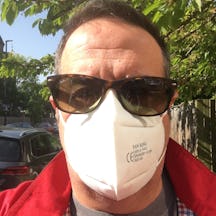
Mark Thomas
Mark Thomas has been a writer and performer for 35 years.
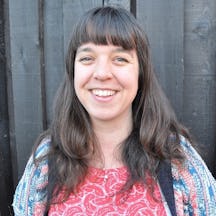
Helen Atkinson
Helen Atkinson is a sound designer working in theatre and live events. Helen has collaborated with Mark Thomas on a number of live shows including ‘Bravo Figaro!’, ‘Cuckooed’ and ‘Mark Thomas’ Check-Up – Our NHS@70’.
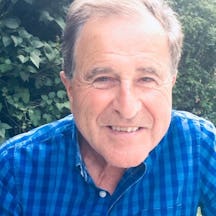
Nicolas Kent
Nicolas Kent was the Director of the Tricycle Theatre in London for 28 years. His political pieces there included: ‘Half the Picture’, ‘The Colour of Justice (The Stephen Lawrence Inquiry)’, ’Nuremberg’, ‘Srebrenica’, ‘Guantanamo’ (nominated for an Olivier award) ‘The Riots’ (2012) and ‘Bloody Sunday’ (Olivier Award for Special Achievement). In 2009, he directed the nine-hour trilogy ‘The Great Game – Afghanistan’ in London, New York and Washington. In 2016 he directed ‘Another World’ at the National Theatre and in 2017 ‘Mark Thomas’ Check-Up – Our NHS@70’. He has also directed productions in the West End, at the RSC, the Royal Court, and on and off-Broadway.
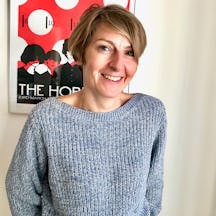
Susan McNicholas
Susan has worked with Mark Thomas for nearly 20 years. She is currently unemployable.
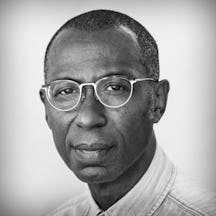
Franklyn Rodgers
Franklyn Rodgers is an artist and creative director whose work explores innovative approaches to re-examining the portrait in contemporary visual culture. His work not only investigates portraiture through narrative, content and context, but also how their placement can open new dialogues in challenging the idea of representation within the language of photography. He has exhibited internationally and his work is held in the permanent collections of the National Portrait Gallery, Tate Britain, Lloyds of London, Welcome Collection, Autograph, Queen Mary University of London and Arts Council England.